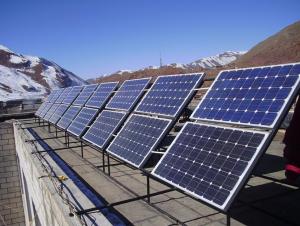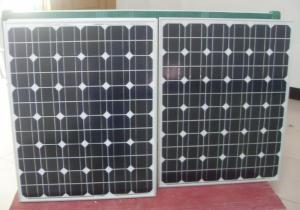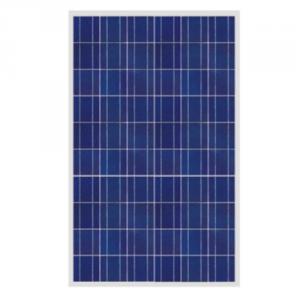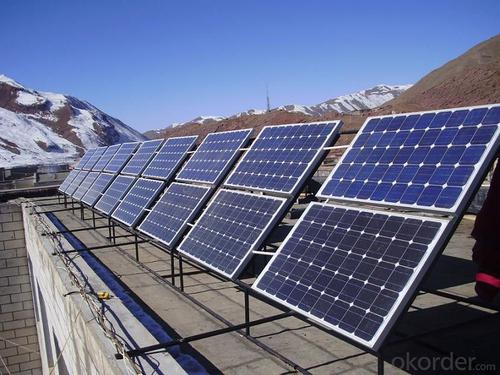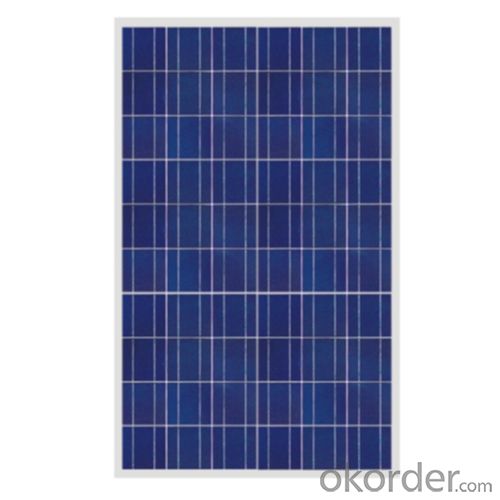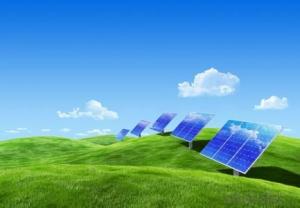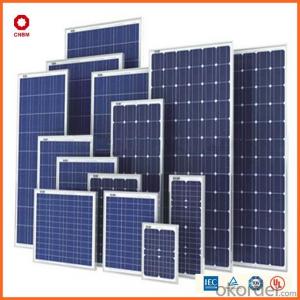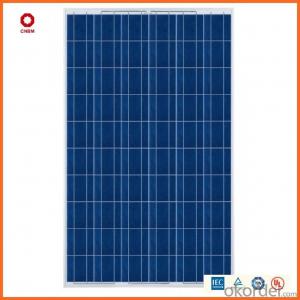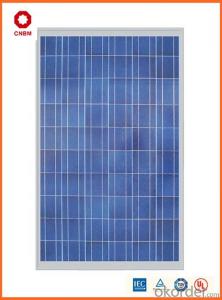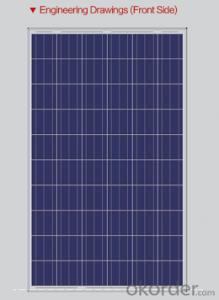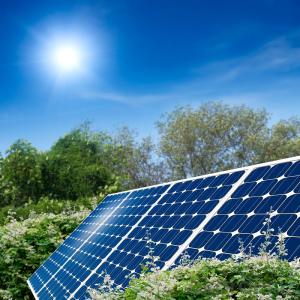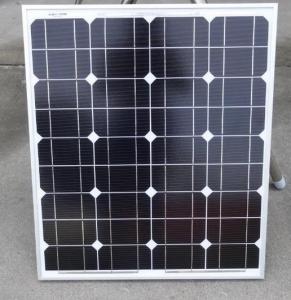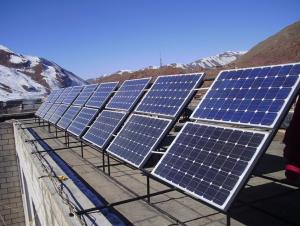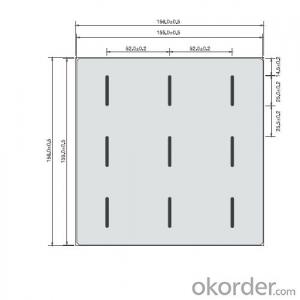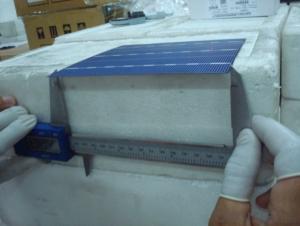CE Certified High Efficiency 75W Solar Cells in Solar Panels Monocrystalline Silicon
- Loading Port:
- China Main Port
- Payment Terms:
- TT or LC
- Min Order Qty:
- -
- Supply Capability:
- -
OKorder Service Pledge
OKorder Financial Service
You Might Also Like
Specifications
CE certified high efficiency 75w solar panel
1)high efficiency and light weight
2)CE ROHS FCC ISO
| Quick Details | |||||
| Model Number: | HP-19 | short circuit current: | 4.81A | Open circuit voltage: | 21.5V |
| Material: | Monocrystalline Silicon | Size: | according to the power | Number of Cells: | according to customer requesting |
| Max. Power: | 75W | Certificates: | TUV,IEC,CE,ISO,CQC,ROHS | Maximum system voltage: | 1000V |
| FF: | 77% | Module efficiency: | >=15.6% | Cell efficiency: | >=16.8% |
| Frame: | Aluminum | Glass type: | Tempered Glass | Temperature range: | _40-+85 |
| Packaging & Delivery | |||||
| Packaging Detail: | packed in international standard cartons(according to the requirements of customers ) for solar panels | ||||
| Delivery Detail: | Around 25 days after receiving deposit | ||||
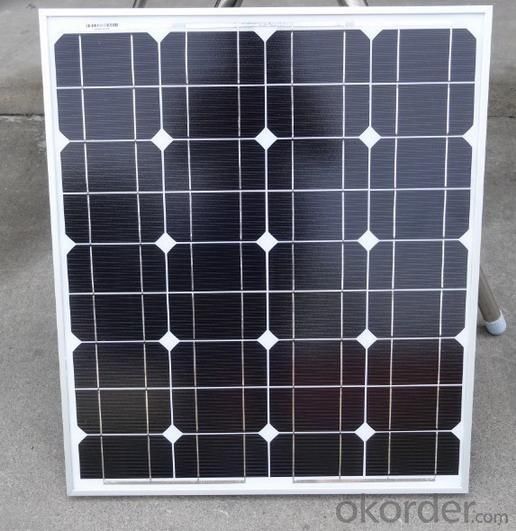
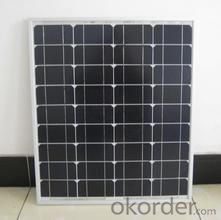
FAQ
We have organized several common questions for our clients,may help you sincerely:
①what price for each watt?
it depends on the quantity, delivery date and payment terms,
②what is your size for each module? can you tell me the parameter of your module?
we have different series of panels in different output, both c-si and a-si. please take the specification sheet for your reference.
③Can you provide the peripheral products of the solar panels, such as the battery, controller, and inverter? If so, can you tell me how do they match each other?
Yes, we can, we have two companies for solar region, one is CNBM International, the other is CNBM engineering Co.
We can provide you not only the solar module but also Solar Cells, the off grid solar system, we can also provide you service with on grid plant.
④What is your warranty system?
Our product performance guarantees for 25 years
• 12 years guarantee for workmanship
• Timeliness of delivery
• Quality Products certified (TÜV, UL, CE, ISO)
⑤How do you pack your products?
We have rich experience on how to pack the panels to make sure the safety on shipment when it arrives at the destination.
⑥ Can you do OEM for us?
Yes, we can.
⑦How long can we receive the product after purchase?
In the purchase of product within three working days, We will arrange the factory delivery as soon as possible. The pecific time of receiving is related to the state and position of customers. Commonly 7 to 10 working days can be served.
- Q: Can solar cells be used in military applications?
- Yes, solar cells can be used in military applications. They can provide a reliable and sustainable source of power for various military equipment and operations, such as powering communication systems, surveillance devices, and remote military outposts. Solar cells offer the advantage of being lightweight, portable, and environmentally friendly, making them well-suited for military use in remote or off-grid locations. Additionally, solar power reduces the dependence on traditional fuel sources, minimizing logistics challenges and enhancing operational effectiveness.
- Q: Can solar cells be used in satellite or space exploration missions?
- Yes, solar cells can be and have been used in satellite or space exploration missions. Solar cells convert sunlight directly into electricity, making them a reliable and efficient source of power for satellites and space probes. They are lightweight, durable, and ideal for harnessing energy in space where traditional power sources are not feasible.
- Q: How do solar cells perform in extreme temperatures?
- Solar cells can be affected by extreme temperatures, both hot and cold. High temperatures can decrease the efficiency of solar cells and reduce their power output, while very low temperatures can also impact their performance. However, modern solar cell technologies have been developed to minimize these effects and ensure better performance even in extreme temperatures.
- Q: Can solar cells be used for powering electric vehicle charging stations with battery storage?
- Yes, solar cells can be used to power electric vehicle charging stations with battery storage. Solar cells convert sunlight into electricity, which can be used to charge electric vehicle batteries directly or stored in batteries for later use. This allows for a cleaner and sustainable way to power electric vehicle charging stations, reducing dependence on fossil fuels.
- Q: How does the solar panel produce it yourself?
- Titanium Dioxide Film The titanium dioxide powder was first put into a mortar and ground with a binder. The film was then slowly dried on a conductive glass with a glass rod. The titanium dioxide film was sintered in an alcohol lamp for 10 to 15 minutes and then cooled The
- Q: Can solar cells be used for powering remote mining operations?
- Yes, solar cells can be used for powering remote mining operations. Solar power is a viable and sustainable energy source that can be harnessed in remote areas where access to traditional electricity grids is limited or non-existent. Installing solar panels at mining sites can provide a reliable and cost-effective source of power for various operations such as machinery, lighting, and communication systems. Additionally, solar power reduces dependence on fossil fuels, minimizing environmental impact and promoting clean energy solutions.
- Q: Can solar cells be used for off-grid power systems?
- Yes, solar cells can be used for off-grid power systems. Solar cells convert sunlight directly into electricity, allowing them to generate power in remote locations or areas without access to the traditional power grid. They are particularly well-suited for off-grid power systems as they are reliable, renewable, and require minimal maintenance. Additionally, advancements in battery storage technology have made it possible to store excess energy generated by solar cells for use during periods of low or no sunlight, further enhancing their suitability for off-grid applications.
- Q: Can solar cells be used in powering autonomous vehicles?
- Yes, solar cells can be used in powering autonomous vehicles. Solar energy can be harnessed using solar panels and converted into electrical energy to power the vehicle's battery or directly power its systems. This allows for a sustainable and renewable source of energy, reducing the reliance on fossil fuels and increasing the vehicle's range and efficiency. However, it's important to note that the amount of energy generated by solar cells may not be sufficient to fully power the vehicle, so it is often used in combination with other energy sources like batteries or fuel cells.
- Q: What is the role of solar cells in powering off-grid cabins?
- The role of solar cells in powering off-grid cabins is to harness energy from the sun and convert it into electricity. These cells, also known as photovoltaic cells, absorb sunlight and generate a direct current (DC), which is then converted into alternating current (AC) through an inverter. This AC power is used to operate appliances, lighting, and other electrical devices in off-grid cabins, providing a sustainable and renewable source of energy without the need for a traditional power grid connection.
- Q: How do solar cells perform in polluted environments?
- Solar cells can still generate electricity in polluted environments, but their performance can be negatively affected. Air pollution, such as smog or particulate matter, can block or scatter sunlight, reducing the amount of light that reaches the solar cells and therefore decreasing their efficiency. Additionally, the accumulation of dirt, dust, or pollutants on the surface of the solar panels can further reduce their performance by obstructing sunlight absorption. Therefore, regular cleaning and maintenance of solar panels are essential to optimize their performance in polluted environments.
Send your message to us
CE Certified High Efficiency 75W Solar Cells in Solar Panels Monocrystalline Silicon
- Loading Port:
- China Main Port
- Payment Terms:
- TT or LC
- Min Order Qty:
- -
- Supply Capability:
- -
OKorder Service Pledge
OKorder Financial Service
Similar products
Hot products
Hot Searches
Related keywords
